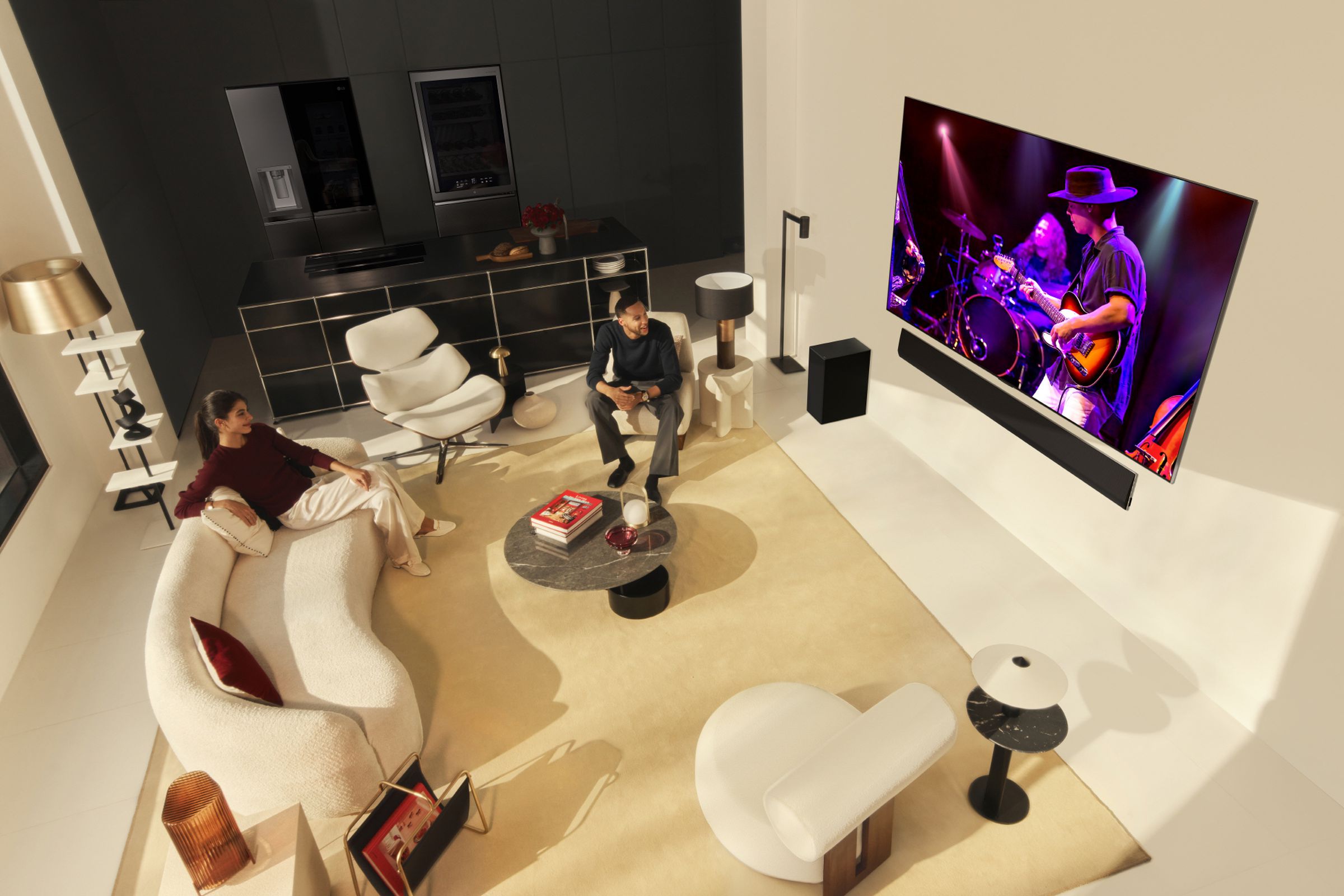A year ago, LG released its brightest OLED TVs yet, and in doing so, the company overcame one of the long-held downsides of the panel technology: they were finally suitable for bright, sunny rooms. Rtings called 2023’s G3 OLED “an outstanding TV with no real weaknesses,” and many other reviews praised it as one of the best TVs ever released. LG also used CES 2023 to introduce its first “wireless” TV, the Signature OLED M, which receives content from a Zero Connect box that can be positioned discreetly in the same room.
So while last year brought pretty major technical upgrades, for 2024, LG is shifting its focus to AI and smaller, iterative changes. But the improvements are still meaningful. Across the OLED TV lineup, LG now supports variable refresh rates up to 144Hz (up from 120Hz), which will be welcome news for PC gamers. The new G4 series brings the company’s Micro Lens Array technology, the secret sauce behind the G3’s significantly brighter picture, to a larger 83-inch screen size for the first time. Meanwhile, the 2024 OLED M line is adding a smaller 65-inch model for those who want the fancy wireless tech in a more modest size.
But the big theme this year is AI. LG’s new a11 processor, found in the M4 and G4 (but not the more mainstream C4 and B4), is said to offer “a 70 percent improvement in graphic performance and a 30 percent faster processing speed compared to its predecessor,” per the company’s press release.
AI upscaling isn’t anything new for LG’s OLEDs, but the company is really hyping the enhancements this year as more capable and comprehensive than ever before. The Alpha 11 chip uses “precise pixel-level image analysis, to effectively sharpen objects and backgrounds that may appear blurry.” It doesn’t stop there:
All driven by the discerning judgment of the AI itself, the company’s OLED TVs deliver a more clear and vibrant viewing experience. Moreover, the ingenious AI processor adeptly refines colors by analyzing frequently used shades that best convey the mood and emotional elements intended by filmmakers and content creators. Dynamic Tone Mapping Pro splits pictures into blocks and fine-tunes brightness and contrast by analyzing variations in brightness where light enters the scene, creating images that look more three-dimensional.
So the AI supposedly now understands creative intent, according to LG, and can adjust your TV’s image settings accordingly. Picture purists can always ignore and disable these AI modes, but many people inevitably leave them on — so if the upgrades are noticeable, they’ll be a difference maker for those customers. But this also means there could be a wider divide between the performance of the G4, which gets the AI tech, and the C4, which does not, than there was between last year’s G3 and C3, which mainly came down to brightness. (The C3 lacked LG’s Micro Lens Array tech, and it’s the same situation for the C4.) The M4 and G4 continue to come with LG’s five-year warranty against any picture defects, including burn-in.
Even the entry-level B4 series has some noteworthy improvements. The biggest among them is that you’re now getting four full-bandwidth HDMI 2.1 ports, all of which are capable of 4K 120Hz gaming. That’s made possible by the TV’s new a8 chip. And LG has also promised five years’ worth of webOS updates for its TVs dating back to 2022, which should at least keep them aligned in terms of menu navigation and user experience for the foreseeable future.
LG hasn’t yet shared pricing for the 2024 OLED lineup, but here’s the sizing breakdown:
LG Signature OLED M
97-inch
83-inch
77-inch
65-inch
LG G4 OLED
97-inch*
83-inch
77-inch
65-inch
55-inch
* does not include Micro Lens Array technology
LG C4 OLED
83-inch
77-inch
65-inch
55-inch
48-inch
42-inch
LG B4 OLED
77-inch
65-inch
55-inch
48-inch
There aren’t any big brightness gains this year for the G4. So my early advice is, if you can find a great deal on the G3, it’s probably worth snagging; you won’t be missing out on much aside from the faster processor and more robust AI picture enhancements. But stay tuned for firsthand impressions from CES in Las Vegas to see if those are worth holding out for.

Leave a Reply